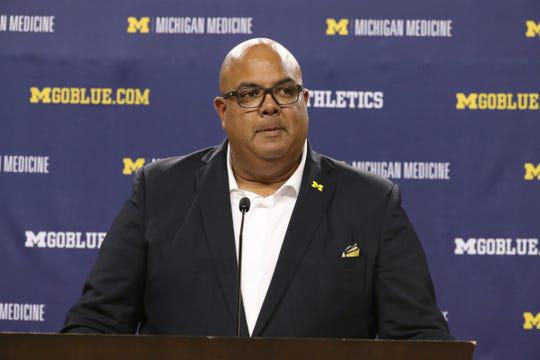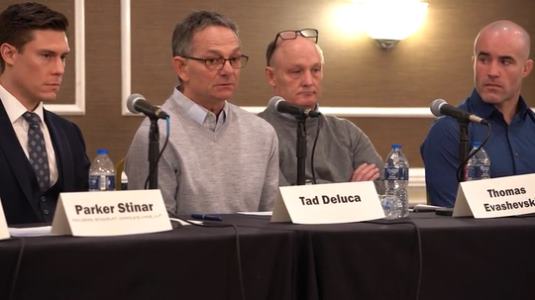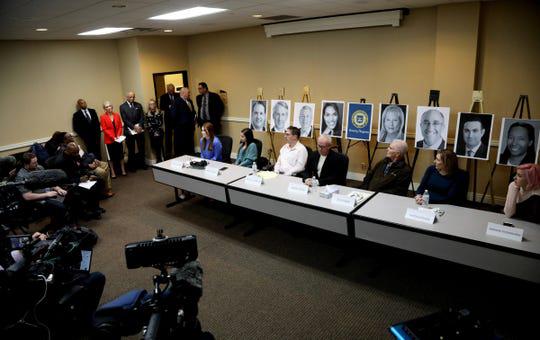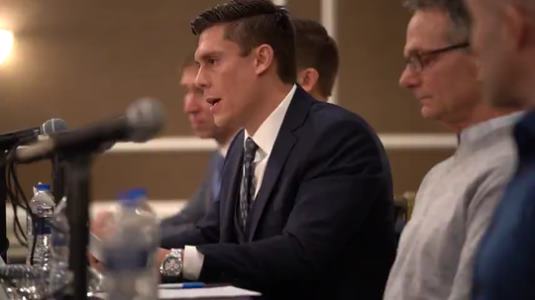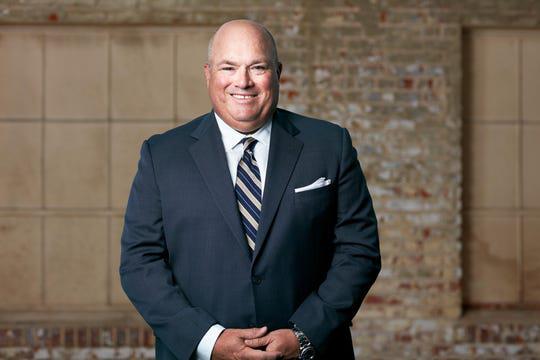|
Michigan's Warde Manuel mishandled Dr. Robert Anderson complaint by sending it to lawyers
By David Jesse
[with video] University of Michigan Athletic Director Warde Manuel did not follow university policy when he forwarded a letter alleging sexual assault by a former football team doctor to the university's lawyers instead of the school's Title IX investigators. Because lawyers got to see the letter before any investigator, they got an early warning of potential liability to the school. There are about 40 lawsuits pending in federal court against U-M alleging the university covered up Robert Anderson's sexual assaults of student athletes for decades. There could be many more lawsuits to come — at least three other prominent lawyers have said they each have dozens of potential victims, none of whom have filed suit yet. "The University of Michigan not following their own policies indicates they were covering something up," said Parker Stinar, the attorney for the man who sent the letter. "Certainly it shows they wanted to approach the Anderson case differently than other cases. The letter was not the first time the current administration had been warned about Anderson. They were warned during the Nassar case, after the Nassar case and during the Ohio State cases. They understood the magnitude of the financial liability they could face."Recent history says any settlement with Anderson's victims could get pricey — Michigan State University paid $500 million to Larry Nassar survivors, the University of Southern California paid $215 million to George Tyndall survivors and Penn State University paid $109 million to Jerry Sandusky survivors. Ohio State University recently reached settlement terms with about half of the Richard Strauss survivors, but terms were not released. Nassar, Tyndall, Strauss and Anderson were all doctors who were accused of sexually assaulting students, including athletes. U-M would not comment on Manuel's actions. Spokesman Rick Fitzgerald said the letter containing allegations against Anderson was sent from the university's lawyers to its investigative office the same day it was receivedand even some plaintiff's lawyers acknowledge that may have ameliorated the issue. Still, experts say the handling of the complaint may go to institutional resistance that persists at universities despite a number of high-profile cases that have been mishandled in recent years. The timelineOn July 18, 2018, Manuel's mail contained a bombshell of a letter. In it, a former U-M wrestler named Tad Deluca detailed how he was sexually assaulted by a former U-M doctor named Robert Anderson. Anderson was the head of student health services when Deluca was in school and a team doctor for the football squad. Anderson had worked with then-Athletic Director Don Canham to make sure all athletes were getting physicals from Anderson, specifically calling out the wrestling team as a group that needed to be ordered to do so. Deluca's letter to Manuel detailed how he had written to his wrestling coach about the abuse in 1975 and was later forced off the team. The letter detailed how Anderson had assaulted him by inappropriately touching his penis and giving him an unnecessary rectal exam. "I am fully aware that it was the 1970s and it was an entirely different world then," the letter to Manuel concludes. "I am also aware that 40 plus years is an extremely long time ago. I expect nothing. I want nothing. I just feel the need to report this." Once he got the letter, Manuel's responsibility was to report it. He did — but not to the right people. "Manuel then forwarded this letter to representatives at the University of Michigan General Counsel Office, who forwarded the letter to (the Office of Institutional Equity)," a police report obtained by the Free Press under a Freedom of Information Act shows. The version told to police is different than the version told to Deluca. On Aug. 6, Pamela Heatlie, the Title IX investigator in the Office of Institutional Equity, emailed Deluca, but left out any mention of the general counsel. "Athletic Director Warde Manuel received your letter to him dated July 18, 2018, and he shared it with me, since I am the University's Title IX Coordinator," according to an email sharedby Stinar with the Free Press. "I hope you do not mind that I am responding in his stead, but generally any concerns about sexual misconduct are shared with me so that I can respond and gather more information, as appropriate." The U-M police department then was informed months later on Oct. 3, 2018, and launched an investigation. The police told OIE to put a hold on the internal investigation until a criminal investigation was completed. No criminal charges were filed, largely because Anderson died in 2008. Manuel's actions were not the correct procedure, according to U-M's policy. U-M's policy on where reports of sexual misconduct should go is simple and straightforward. "Responsible employees must immediately report any information they learn about suspected Prohibited Conduct to OIE or the Title IX Coordinator," the policy says. "Failure by a responsible employee to timely report a suspected Prohibited Conduct may subject them to appropriate discipline, up to and including removal from their position." Manuel is a "responsible employee," according to the policy. There is no exception listed in the policy for an employee to report misconduct to the lawyers instead of the Title IX offices. The Free Press asked U-M whether it was misinterpreting the policy or missing an exemption. The university did not answer that question, instead saying the letter was passed on promptly to the OIE. "The very day that Warde Manuel received it, he shared it with the Office of the General Counsel and it was shared with OIE," Fitzgerald told the Free Press. "The fact that there was no delay whatsoever getting the letter to OIE is the most important point we want to make. "An OIE and U-M Police investigation was launched and police investigators were able to identify additional former patients who believe they were subjected to sexual misconduct. ... "The university has engaged the WilmerHale law firm to conduct an independent investigation regarding how this matter was handled. Through April 8, there have been 199 unique complaints regarding Dr. Anderson, most received through the hotline." Does it matter?In 2015, the federal Department of Education sent a "Dear Colleague" letter reminding institutions of the need for a Title IX coordinator at each place. In the letter outlining the responsibilities of the coordinator, the government also says who shouldn't be the Title IX coordinator. Included in that list are general counsels because they could have a conflict of interest. The conflict of interest is simple — a general counsel's job is to protect the university, including limiting legal liability. So sending a complaint to the general counsel first raises questions, multiple attorneys involved in Title IX cases told the Free Press. "The first thought of (a general counsel's) is, 'Oh crap, we've got liability problems,' " said John Manly, an attorney who represented victims at MSU, USC and the Catholic Church. He is also representing dozens of Anderson victims, but has yet to file a suit against U-M. Getting the general counsel involved early also gives a university a chance to talk through issues in conversations protected by attorney-client privilege. "Without litigation discovery, we will never know what (administrators) knew about Anderson," Stinar said. "With discovery we might not know either. I can depose Manuel and ask him why he sent it to the general counsel. I can depose Heatlie and ask about her handling of the case. I can't depose (U-M general counsel Timothy Lynch) and ask about how conversations he was involved in went." "The fact that the AD reported to the OGC shows that even the highest level university officials do not know what they are supposed to report to," attorney Deborah Gordon, who has sued U-M on behalf of students accused of sexual assault and students accusing others of sexual misconduct, said in an email to the Free Press. "Moreover, why do they list people as “responsible employees” or “appropriate persons” when they are not? The OGC sending this to the OIE ameliorated the error by the AD. From the time it got to the OIE, UM had 'actual notice,' which then makes them responsible." Manuel's decision points out a larger issue, said attorney Mike Cox, who represents more than 35 alleged Anderson victims who have sued the school. "I don’t think it matters because he appears to have forwarded right away," he told the Free Press. "But if you read (the police report), it appears that Ms. Heatlie does nothing for months, until October when (a detective) is assigned. The issue for Cox is that the university didn't publicly acknowledge the Anderson investigation until one of Anderson's accusers, Roger Stone, went to the Detroit News this February with his account. "Here is what I think is more disturbing: The GC and President (Mark) Schlissel sat on this, read covered it up," he said,adding U-M acknowledged it only "because Mr. Stone goes to the paper." Manly, the attorney, said his clients want to see U-M prosper and want the university to be known for doing what is right, but items like sending the letter to the attorney put doubt into the mind. "It's disappointing to see this and the delay in acting," Manly said. "They still have this window where they can make it right, but it's not a big window." Contact: djesse@freepress.com
|
.
Any original material on these pages is copyright © BishopAccountability.org 2004. Reproduce freely with attribution.
